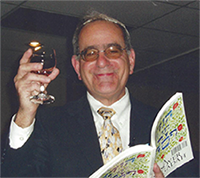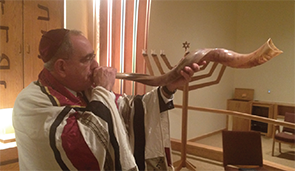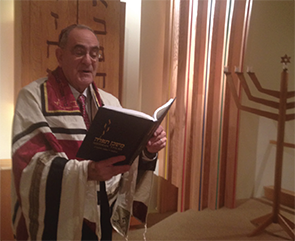
Dr. Block at the congregation’s annual Seder.
Sidney R. Block, MD, has practiced rheumatology in Maine since 1975, where he now lives on the coast in Northport. He has received the Paulding Phelps Award and been recognized as a Master by the American College of Rheumatology. He is also a lay cantor for the Jewish reform congregation in Bangor, which he helped found. As a cantor, Dr. Block leads services and prayers, and participates in weddings and funerals.
From Maryland to Maine
While growing up in Baltimore, Dr. Block received his religious education at a reform Jewish synagogue. That’s where he attended services, developed spiritual roots and where his Bar Mitzvah took place.
After graduating from Johns Hopkins Medical School in 1967, Dr. Block completed his medical training at the New York Hospital—Cornell Medical Center and the University of California San Francisco Medical Center. He then served in the Air Force for two years, stationed in Spokane, Wash., where he and his wife, Martha, became infatuated with the Pacific Northwest.
When Dr. Block was completing his rheumatology fellowship at the Hospital for Special Surgery in New York, he and his wife began searching for a new home in a community that shared the physical beauty of the Northwest. Because both of their families lived on the East Coast, their search focused on the Northeast and led them to Bangor, Maine.
One factor that influenced their decision to move was the presence of a Jewish community in Bangor that dated back to the mid-19th century and supported two synagogues, one orthodox and another conservative. However, Bangor did not have a reform synagogue, which represents the third major branch of Judaism, and better reflected Dr. Block’s religious training and background. That would later prove challenging.

Dr. Block, blowing the shofar.
After moving to Bangor in 1975, Dr. Block set up a private practice. Two years later, another rheumatologist, Dr. Geoffrey Gratwick, joined his practice. Dr. Gratwick would remain his partner for the next 37 years.
By 1980, Dr. Block and his wife had two children, Katherine and Benjamin, ages 4 and 5. Because there was no synagogue for reform Jews, they considered home schooling their children for their religious education. But that idea was far from appealing. Jews prefer to pray and learn as a community.
The Solution
Meanwhile, Dr. Block was aware of five other reform Jewish physicians in the community who were facing the same dilemma. He had an idea: Why shouldn’t they gather together to observe religious services, celebrate holidays and offer religious education to their children? Perhaps more local families would be interested in joining them.
In 1981, all six families decided to host a public meeting and placed a notice in the local newspaper. The question was simple: Would anyone be interested in forming a reform congregation? To their surprise, roughly 100 people attended, and 14 families signed on. Thus, Congregation Beth El was born, and a formal religious school was started a few years later.
Thirty-four years later, Congregation Beth El has grown to support nearly 140 families. It has a full-time rabbi, a synagogue of its own, a religious school for children and even a cantor—Dr. Block. During services, he leads the congregation in chanting Hebrew prayers and songs. Dr. Block says serving as a lay cantor over the decades has added another dimension to his spiritual side that even his non-Jewish patients acknowledge and appreciate.
Custom Chants
The organization that helped Dr. Block and the other families establish a reform synagogue was the Union of American Hebrew Congregation (UAHC).

Dr. Block, chanting a prayer.
“We called the Union, which gave us support and legitimized our efforts for starting this congregation,” Dr. Block says. “The organization gave us moral support, provided us with an occasional visiting rabbi and loaned us a Torah. The rabbi who came to conduct our first High Holiday services gave us a shofar,” a musical instrument of ancient origin, made of a horn, traditionally that of a ram.
Although Dr. Block has never learned how to read music and has never had a formal voice or music lesson, he can hold a tune and remembered how to chant some of the prayers he was taught in Hebrew school as a young boy. By default, he became the congregation’s cantor.
The UAHC connected Dr. Block with an ordained cantor in Boston. Every six months or so, Dr. Block would request prayers, and the cantor would sing the prayers, record them on cassette tapes and then mail them to Dr. Block. While driving between his home in Bucksport and private practice in Bangor, Dr. Block would spend the half-hour each way playing the prayers over and over again, trying to mimic the cantor. He jokingly refers to himself as a Suzuki-trained cantor; the Suzuki teaching method involves repetition and saturation in a musical environment.
Gradually, Dr. Block incorporated more and more of the prayers into the congregation’s services. Over the years, his repertoire has grown to the point where he can chant every important prayer necessary for Shabbat (i.e., Sabbath), the High Holidays, Seders, funerals and other religious events.
“I guess I did reasonably well,” says Dr. Block. “At least nobody else wanted my job.”
He says there were parts of the cantor’s well-rehearsed prayers that were completely beyond his vocal capabilities. So he customized these prayers to camouflage his limited vocal skills. He explains that he would patch together small interludes or little connections of his own creation for the parts he was unable to mimic. As a result, some of his prayers took on a unique melody all their own, referred to in Hebrew as Nusach, or the tune used when a cantor recites a prayer.
Dr. Block enjoys telling stories about the children in his congregation who grew up accustomed to his personalized style of chanting. While in college, some would call home after attending services, telling their parents that although the people in the other congregations were very welcoming, “They just don’t know the proper melodies.”
The Melody Goes On
Two years ago, Dr. Gratwick was elected to the Maine State Senate and retired from medicine. So he and Dr. Block decided to close the Bangor practice, and Dr. Block joined the staff at the Waldo County General Hospital in Belfast.
Dr. Block continues to participate in services for the reform congregation he helped establish. Nowadays, he points to some of the congregation’s choir members who have wonderful voices. He says they are learning how to sing prayers in the more traditional style and will easily be able to fill his shoes when the time comes.
“To my good fortune, the ears of our original congregants have aged at the same rate as my voice,” he says.
Looking back, Dr. Block believes that establishing the reform synagogue was definitely a worthwhile endeavor, not only for himself and his family, but for the other members of the community who joined, and even for his patients.
“My participation in the spiritual life of Congregation Beth El, as reflected in its music, led to a deeper understanding that my practice of medicine had to involve much more than attending to just the physical well-being of my patients.”
Carol Patton, a freelance writer based in Las Vegas, Nev., writes the Rheum after 5 column for The Rheumatologist.